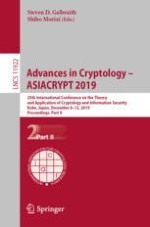2019 | OriginalPaper | Buchkapitel
Order-LWE and the Hardness of Ring-LWE with Entropic Secrets
verfasst von : Madalina Bolboceanu, Zvika Brakerski, Renen Perlman, Devika Sharma
Erschienen in: Advances in Cryptology – ASIACRYPT 2019
Aktivieren Sie unsere intelligente Suche, um passende Fachinhalte oder Patente zu finden.
Wählen Sie Textabschnitte aus um mit Künstlicher Intelligenz passenden Patente zu finden. powered by
Markieren Sie Textabschnitte, um KI-gestützt weitere passende Inhalte zu finden. powered by
